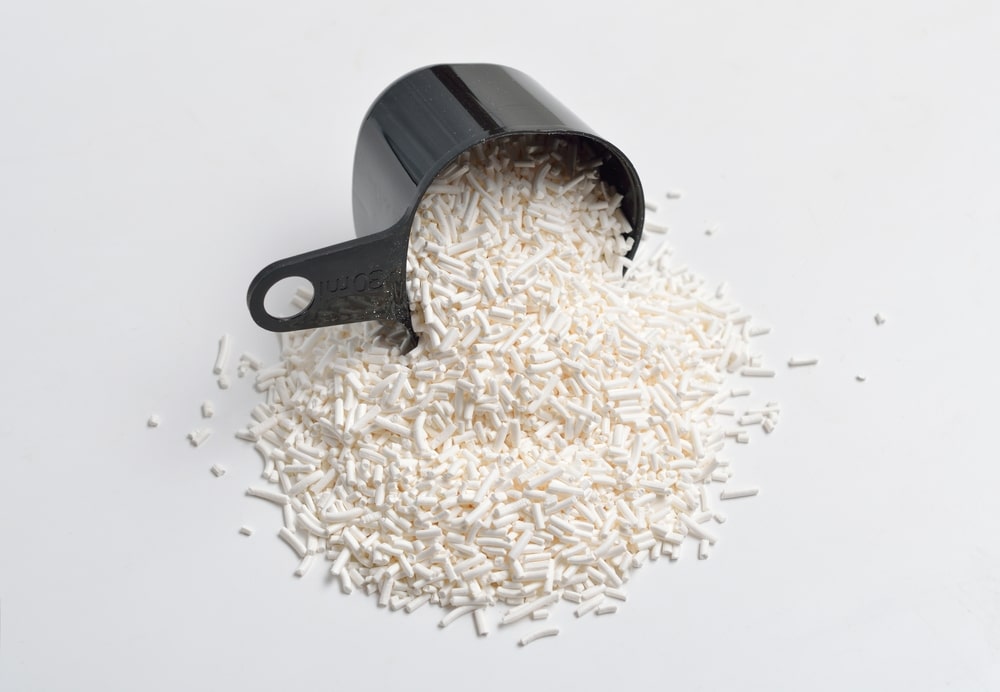
Potassium sorbate is one of the most used food preservatives that’s used in baking recipes as it helps prevent the development of microbes and mold. In most cases, it is used in icings, cakes, margarine, cheese, beverage syrups, pie fillings, and wine. In addition, it can be used in drinks and prevents the growth of fungus and mold. Since it doesn’t have any smell or color, it blends into the food products pretty easily. However, it is not readily available, which brings us to the substitutes!
Potassium Sorbate Substitutes
- Benzoates
In most cases, sodium benzoate is used to prevent food spoilage from harmful molds, yeasts, and bacteria. In addition, it’s a great way of maintaining the freshness in food as it helps slow down the changes in texture, color, pH, and flavor. It actually inhibits the growth of microbes and mild in the food to prevent spoilage. It’s recommended to use sodium benzoate in acidic food items, including soy sauce, salad dressings, jelly, lemon juice, and pickles.
- Propionates
When it comes down to propionates, calcium propionate is the most promising food preservative that’s used in baked foods. It works as a preservative that helps extend the shelf life – it can interfere with the microorganism’s reproduction and growth. In addition, it helps mitigate the growth of bacteria and mold, which extends the shelf life of baked products, including bread, processed meat, dairy products, and whey.
- Nitrites
Nitrite and nitrate salts are also used as a preservative in the food and baking industry. These salts are usually used for curing meat as well as other perishable produce. In addition, these salts can be added to the food for preservation and limit the production and spread of harmful microorganisms. These salts are usually used to cure sandwich meats, sausages, salami, and bacon to enhance their color and appearance.
- Sulfites
The sulfites can also be used as food preservatives in beverages and food items to prevent bacterial growth and oxidation. In addition, these preservatives help prevent the non-enzymatic and enzymatic browning in dried, raw, canned, and frozen fruits and veggies. It can block microbial growth by interrupting the cells’ functioning. The best thing about this preservative is that it’s safe for regular consumption and doesn’t cause any health risks.
- Vitamin E
In particular, vitamin E oil is used as a preservative as it is an antioxidant. It plays an essential role in extending the shelf life of oil-based food products, accrediting to the anti-oxidation properties. However, it’s not considered a preservative by experts, and it’s best that you don’t use it in water-based products.
- BHA
BHA is commonly known as butylated hydroxyanisole, and it is a waxy solid that’s used to preserve meats, lard, and butter. It is widely used in keeping fats from going rancid. Moreover, it works as a yeast defoaming agent to make sure the snack foods, butter, baked goods, beer, and snack foods are safe to eat and remain fresh for a longer time period.
- Vitamin C
Vitamin C is another preservative that you can use, especially if you have to bake bread or cured meats. In addition, it can be added to spreads, sauces, jams, and jellies. Since it has ascorbic acid, it will also increase vitamin supplementation. The best thing about vitamin C is that it has anti-oxidant properties, which prevent the darkening of the fruits.
- BHT
BHT is the shorter form of butylated hydroxytoluene, and it is widely used as preservatives and anti-oxidants in food, animal feed, and food packaging. It is commonly used to preserve the appealing flavor, color, and odor of food. However, it’s recommended that you use BHT in combination with BHA to make sure the preservation remains intact at higher temperatures as well.
- Polyphosphates
Polyphosphates are basically the food additives that belong to the stabilizers, emulsifiers, and thickeners range. These compounds are added to food products, including dairy products, cheese, processed meat, and seafood. In addition, it can help improve the quality of food and extend the shelf life.
The bottom line is that these substitutes work great in place of potassium sorbate. However, you must be careful about how much you add to ensure stable food quality!